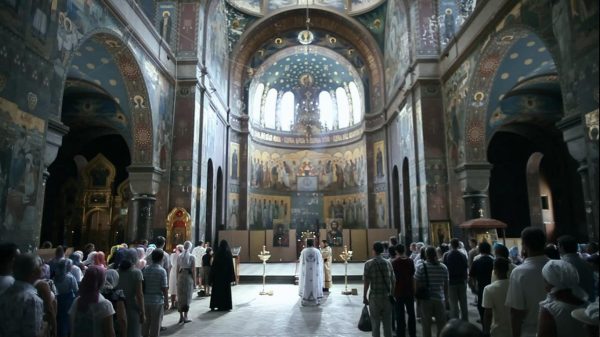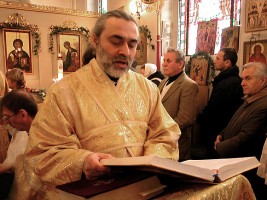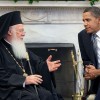Every religious tradition in the United States is seeing its membership decline. But according to the most recent Pew Study, few Christian traditions are seeing their members head for the doors as quickly as the Orthodox—only 53% of adults who were raised in the Orthodox Church still identify as Orthodox.
Professional statisticians will note that the sample size of Orthodox in the Pew study is small, but the Greek Orthodox Archdiocese’s own published statistics on marriages and baptisms over the past forty years suggests that the retention of its younger members is falling dramatically.
Is our parochial use of Liturgical Greek part of the problem?
As someone who has studied Ancient and Byzantine Greek for the past 25 years, I will be the first to affirm that Greek enables a level of theological nuance unmatched by other languages, especially English. But very few Orthodox in America have the training to navigate the complexity and sophistication of our Liturgical poetry in its original form.
Across the United States, GOA parishes vary in their use of language: some are Greek only, some are English only, and most employ some combination of the two, often repeating key elements (biblical readings, the Creed, and the Lord’s Prayer) in both languages.
But apart from the sermon, the Greek used is not Modern Greek, it is a form of medieval Greek, composed between the fourth and twelfth centuries.The vocabulary is similar to Modern Greek, but many words are obscure. The grammar and syntactical structure are completely different. To be sure, some aspects of the Divine Liturgy, like the Petitions, are repeated every week, which allows those who attend regularly to follow whether they know any medieval Greek or not. But many hymns and the scripture readings change daily, making them largely incomprehensible, even for fluent Greek speakers.
In short, the vast majority of communicants in the Greek Orthodox Archdiocese do not understand what is being said or sung at several points in the course of any given service. And it’s not because quality translations do not exist. They do. But for a variety of reasons, priests across the Archdiocese are not using the translations as often as they should.
The problem of Liturgical comprehension, of course, exists elsewhere, including the Church of Greece and Serbia, where the Liturgical language is, at least partially, unrecognizable to communicants. Efforts in those countries to introduce modern language have been met with fiery denunciations from the would-be defenders of traditional worship.
Back in the US, a separate study conducted by the Public Religion Research Institute this fall asked people who had left organized religion why they had done so. The most popular response was that “they no longer believed what their church taught.”
We can only assume that former Orthodox respond similarly. But given that teenagers in some of our parishes can go an entire service without understanding 75% of what they hear, one wonders if they even know what their Church teaches when they opt out of organized religion their twenties or thirties.
Of those who do remain in the Church—at least initially—more than 80% marry someone outside of the Orthodox faith. Interfaith marriage offers an extremely rich opportunity for growth and evangelism. But all too often, the language and cultural barriers are too high a hurdle for the incoming spouse and, as a consequence, both husband and wife leave the Church forever.
What is perhaps the most disconcerting is that the perpetuation of medieval liturgical language (whether Greek or Slavic) is that it is completely at odds with the tradition of the Orthodox Church, which historically embraced live indigenous languages as an instrument of evangelism. Even before the legalization of Christianity in the Roman Empire, Christians were worshiping in more than a dozen languages including Aramaic, Armenian, Coptic, Georgian, Latin, and Syriac. In perhaps the most famous example of linguistic evangelism, Sts. Cyril and Methodius invented the Glagolytic alphabet in the ninth century so as to effect the conversion of millions of Slavs to Christianity.
In other words, to use liturgical language in a “traditional” manner means to use a language that is comprehensible to those worshiping.
Given the Church’s historical practice of employing indigenous languages, given the fact that the majority of young Orthodox in the GOA do not know Greek, given that fluent Greek speakers struggle with Liturgical Greek, and given that our young people are leaving the Church in droves, it is time that our hierarchs, priests, and lay leaders take a hard look at the continued relevance of Liturgical Greek.
We must resist the temptation to view the language of the Divine Liturgy as a symbol communal identity and, instead, see it for what it ought to be—a pastoral tool to inspire the community in a language it actually understands.
To those who might counter that the continued use of Greek is pastoral, I would respond that if the Church is truly concerned about the pastoral needs of its Greek-speaking minority, then it should employ Modern Greek.
While the use of Liturgical Greek is not the most important factor leading young people to leave the Church, it is undeniable that it is a contributing factor for many of them, especially those in interfaith marriages. Let’s hope that we can hear and understand what the younger members of our community are telling us before it is too late.
George Demacopoulos is the Fr. John Meyendorff and Patterson Family Chair of Orthodox Christian Studies and Co-Director of the Orthodox Christian Studies Center at Fordham University.
















